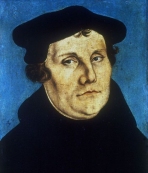By Faith Alone: The Conversion of Martin Luther

It was the moment he had been waiting for. His father was in the audience watching, as were his fellow monks. It was time for Martin to offer his first mass, and he was overwhelmed with the solemnity of the event. He led the congregation, saying, “We offer unto Thee, the living, the true, the eternal God.” Suddenly Martin froze. He couldn’t go on. He later wrote:
“At these words I was utterly stupefied and terror-stricken. I thought to myself, ‘With what tongue shall I address such majesty, seeing that all men ought to tremble in the presence of even an earthly prince? Who am I, that I should lift up my mine eyes or raise my hands to the Divine Majesty? . . . For I am dust and ashes and full of sin and I am speaking to the living, eternal and true God.’”[i]
This glimpse of truth about the holiness of God and the sinfulness of man changed Luther forever.
First, Luther began to look for antidotes for his own sinfulness. He was already a monk, and spent his days in prayer and service. Still, as he looked at his life closely, he found sins in thought, word and deed. In the monastery, Luther spent up to six hours a day confessing his sins to a priest. But later, he would always remember sins he had forgotten to confess. Questions nagged at him. If only confessed sins were forgiven, what would happen if he forgot one? What about all the sins he might have committed in ignorance? Luther began to see that his sinful actions were like smallpox pustules — nasty, external manifestations of the internal, systemic disease of sin.
He fasted for days and refused blankets at night, believing that he earned merit with God through self-imposed suffering. One day he would proudly say, “I have done nothing wrong today.” But on reflection, he wondered if he had indeed fasted enough, prayed enough, suffered enough and served enough. During a visit to Rome, he climbed a staircase on his knees, saying a prayer on each step. The Catholic Church promised that this was a means of grace. But when he got to the top, he wondered aloud, “Who knows whether it is so?” Luther later described this time: “I was myself more than once driven to the very abyss of despair, so that I wished I had never been created.” He was in torment.
Luther threw himself into study, hoping to distract himself by preparing a series of lectures on the Psalms and Romans. And there, in the Word, he found the answer.
I greatly longed to understand Paul’s Epistle to the Romans and nothing stood in the way but that one expression, “The justice of God”… Night and day I pondered until I saw the connection between the justice of God and the statement that “the just shall live by faith.” Then I grasped that the justice of God is that righteousness by which through grace and sheer mercy God justifies us through faith. Thereupon I felt myself to be reborn and to have gone through open doors into paradise.
That was the missing piece, the reason sinful humans could love God—the doctrine of justification by faith alone. This rediscovery led to a wildfire of revival across Europe called “The Reformation.” It changed the world forever.
[i] All the quotes in this article are taken from Here I Stand: A Life of Martin Luther
Roland H. Bainton, Abindon Press, 1950

